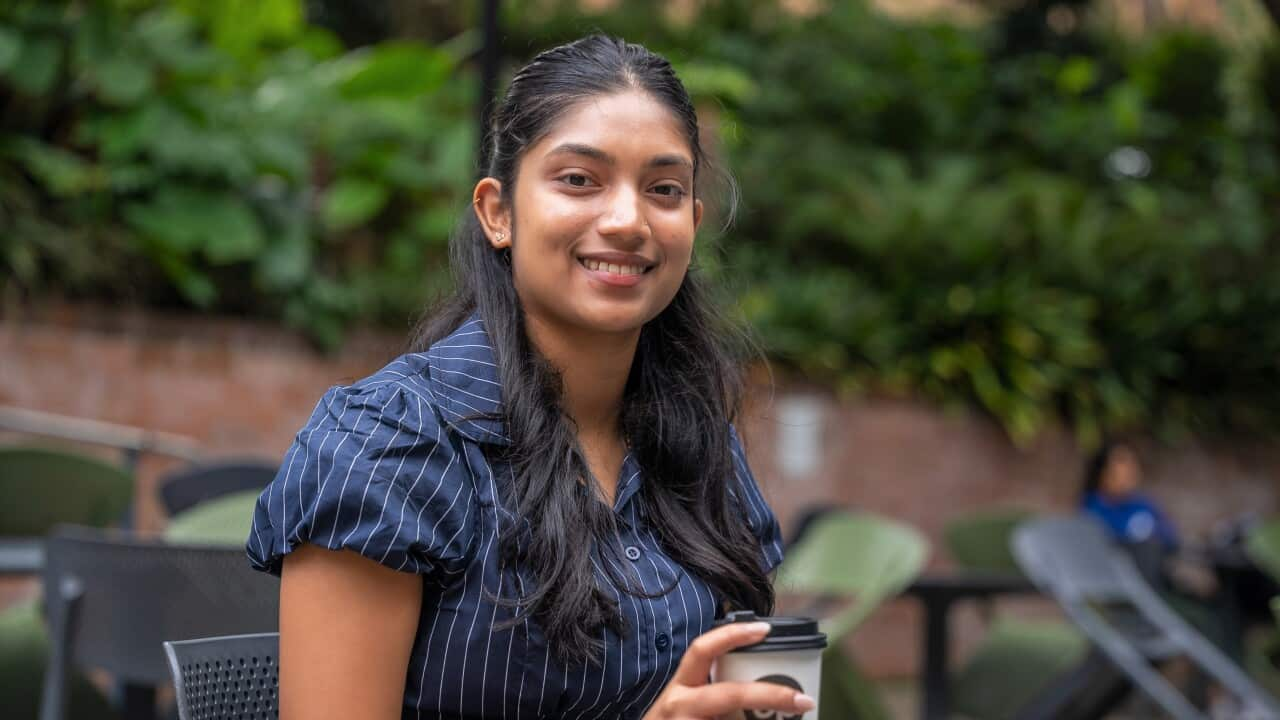Anandikaa Ramesh is a migrant from Sri Lanka who is studying twin degrees at The University of Sydney. As a woman, she has defied the odds by choosing to study the rare combination of software engineering and commerce.
"In my programming tutorials and in class, women are usually in a minority," the 20-year-old said.
"For every 20 students, only four would be women."
Gender disparity in science, technology, engineering and mathematics (STEM) is nothing new for Ramesh.

Anandikaa Ramesh hopes to pursue a career in financial technology when she graduates. Source: SBS / Spencer Austad
'Role model' for women in STEM from diverse backgrounds
For her final exams in 2022, Ramesh was part of a select group of girls studying advanced mathematics at Penrith Selective High School in Sydney's west.
"I was really passionate about maths and also good at it. I really liked problem solving and I found that I was a logical thinker," she said.
"So, for me, software engineering seems very logical and algorithm-based. I also have a passion for commerce, so I thought it was best to combine the two streams at university."
Yet, women hold less than 37 per cent of university STEM spots. By forging her own path, Ramesh hopes to help change that
"I'd really love to be a role model for young women and people from diverse backgrounds and also girls from where I live, in western Sydney," she said.

Shane Griffin, associate vice president of Sydney Future Students at The University of Sydney, hopes to encourage more women to pursue STEM courses. Source: SBS / Spencer Austad
"It is a really exciting long-term project for us, and one that aims to make a substantial difference, eventually adding 300 additional female STEM graduates into the workforce," he said.
The ambitious 20-year program will create a "pipeline" for high school girls in western Sydney into STEM education and careers.
"We hope to bring about generational change, addressing diversity, skills and participation in STEM," Griffin said.
A $100 million donation
The program has been made possible by a record $100 million donation from the Khuda Family Foundation, the largest ever received by a university in NSW. It is supported by tech founder and Bangladeshi migrant Robin Khuda.
"Robin Khuda was an international student who recently sold his company AirTrunk for a large sum and was keen to give back," Griffin said.

Tech founder Robin Khuda (centre) in discussion with students Loretta Payne (left) Anandikaa Ramesh (centre) and Samantha Jap (right). Source: Supplied / Michael Amendolia/ The University of Sydney
"After founding the company in 2016, Mr Khuda found it challenging to hire women for technical and senior management roles, increasing his awareness of the crucial need to diversify the pipeline of employees," Griffin said.
The STEM program aims to attract female students to relevant courses in high school and then retain and support them through tertiary studies to pursue STEM careers.
The fight to close a 'very large' participation gap
Women still represent only 15 per cent of all people working in STEM jobs, according to the federal government's STEM Equity Monitor 2024.
It's one reason the program is welcomed by Sally-Ann Williams, CEO of innovation hub Cicada Innovations and chair of the federal government's recent Pathway to Diversity in STEM Review.
"I absolutely commend Robin Khuda and the University of Sydney for taking a very intentional approach to changing the ratio of the number of women in engineering and computing and in STEM degrees," she said.
"It is very pleasing because that was one of the key recommendations in our review," Williams said.

Sally-Ann Williams is an innovation hub founder. Source: Supplied / Cicada Innovations
"Key to this is how we govern academic and research institutes and our private sector companies to ensure they are safe and free from bullying, harassment and misconduct," she said.
"And if directors are not demanding oversight of what's going on in their workplaces and directly addressing those, then they are being negligent in their duties."
Williams said boosting diversity across government and private sectors is crucial to improve productivity outcomes.

The STEM program will encourage more women to take up engineering degrees. Credit: Getty Images
"Yet it is critical for the STEM sector in Australia to become more diverse, including workers from different gender and socioeconomic, ethnic, regional or urban backgrounds.
"Research shows that diverse teams create better outcomes and higher success metrics for companies and government agencies, because all points of view are considered."
From July this year, The University of Sydney's STEM program will start outreach in public and private high schools across Sydney’s west. When fully implemented, the program aims to reach 40,000 high school students.
The first pilot scholars are expected to enrol at the university in 2027.
Ramesh expects to finish her engineering and commerce degrees in 2028. Her longer-term goal is a career in finance technology.
She hopes other young women will follow in her footsteps.
"A lot of women are unaware of what engineering is and what engineers do.
"And it is essentially why they're not entering these fields.
"If young girls see more women in these STEM-based jobs, hopefully, they will be encouraged to apply."



